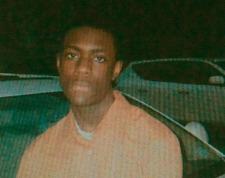NYPD Officer Pleads Not Guilty in Killing of Unarmed Black teenager, Released on bond
/ From [HERE] and [HERE] A New York police officer who shot and killed unarmed Bronx teenager Ramarley Graham in his bathroom has pleaded not guilty to manslaughter charges.
From [HERE] and [HERE] A New York police officer who shot and killed unarmed Bronx teenager Ramarley Graham in his bathroom has pleaded not guilty to manslaughter charges.
Richard Haste, the first serving NYPD officer to face criminal charges for a fatal shooting since 2006, turned himself in and was arraigned at a Bronx criminal court on charges of first and second degree manslaughter over the killing of the 18-year-old. Haste, a four-year veteran of the force, was released on $50,000 bail. He faces a maximum of 25 years in prison if convicted. "Officer Haste's actions were neither reasonable nor justified," said assistant district attorney Donald Levin at Wednesday's hearing.
The shooting took place on 2 February after officers followed Graham to his home on suspicion that he was carrying a gun. When news of the teen's death broke, the police initially said he had disobeyed orders to stop and ran into his home. Surveillance footage later showed the young man calmly entering his building. Moments later officers are seen rushing to the door, attempting to break it down.
Haste pursued Graham into his bathroom on the second floor of the building and shot Graham once in the chest as his 6-year-old brother and elderly grandmother looked on. A small bag of marijuana was allegedly found in the toilet near Graham's body but no weapon was ever recovered.
Haste was stripped of his badge and gun, as was his supervisor, sergeant Scott Morris. A grand jury was convened and district attorney Robert Johnson's office joined the NYPD's internal affairs bureau in a four-month investigation.
On Wednesday, Levin described a scene in which Graham stared down the barrel of Haste's gun with no means to escape.
"Once this officer gained entry", Levin said, "he stood face to face with Ramarley Graham.
"Ramarley Graham was in the bathroom with absolutely nowhere to go," Levin said. "Officer Haste consciously and deliberately pulled the trigger."
He added that the case is "not about what he was told out on the street by his fellow officers", Levin said, challenging claims that Graham's death was the unfortunate consequence of bad information.
Inside the court, the Graham family and their supporters – including Reverend Al Sharpton – filled four rows of benches, occupying over half the seating area. On the other side sat a crowd of large men with close-cropped hair, one with an NYPD badge hanging from his T-shirt collar.
Haste, a short white man with brown hair, stood in court flanked by his attorneys and only spoke once to enter his not guilty plea.
The indictment presented to supreme court justice Martin Marcus at Haste's arraignment accuses the officer of "acting with intent to cause serious physical injury (to Ramarley Graham) by shooting him". The grand jury accused Haste of acting "recklessly" in causing Graham's death.
Haste's attorney, Stuart London, said it was Graham's failure to raise his hands that resulted in his death, claiming his client was "desperate" for the teenager to do so.
"All he had to do was show him his hands," London said. Instead he claimed Graham "chose to make a quick gesture to his waistband".
"This officer had no choice," London said, adding that Haste had previously went on record to say: "I thought he was going to shoot me, so I shot him."
London said three members of Haste's team stated they saw a gun on Graham in the moments that led up to his killing, and argued that it was not appropriate to second guess the actions of police officers in such high-intensity situations.
He said the attempts to break down Graham's front door after he entered the building was an example of "taking police action". London said Haste yelled "gun" twice after shooting Graham.
London described Haste as a "hard-working individual" who grew up in the Bronx, served time in the military and still lives in the community. He said his client had been in one of the NYPD's so-called street narcotics enforcement units for roughly 60 days at the time of the shooting.
After the hearing, Graham's father, Franclot, said he was not fully satisfied with the charges but they marked the beginning of a longer process.
"I'm not happy," he said, but added, "It's a first start in seeking justice for my son, our son, Ramarley. Was it the start I'm looking for? No, but it's a start.
"Ramarley is not coming home to us. We won't have him for Father's Day," he said. "Haste is going home to his family. When we leave here we're going to the cemetery."
"I keep asking why, why, why, why. Why did he kill our son?" Graham added through tears. "Eighteen years old. Eighteen. He did nothing to deserve this."
Outside the courthouse, police union president Patrick Lynch said he respected the Graham family's grief, but called it a tragedy resulting from a difficult situation.
"Today, we're here to show support for a New York City police officer who was put in a terrible position doing a difficult job," Lynch said.
Graham's shooting inflamed an already tense relationship between New York City's low-income communities of color and the NYPD, and prompted a review of the department's street narcotics units.
The department is facing increasing criticism for its street-level policing practices, particularly in low-income neighborhoods. Critics say its so-called stop-and-frisk policy – which last year resulted in nearly 700,000 encounters between police and citizens, mostly black and Latino – has resulted in the criminalization of minority youth.
On Wednesday, city council members introduced legislation to create an inspector general to oversee the department.





































































































































































































































































